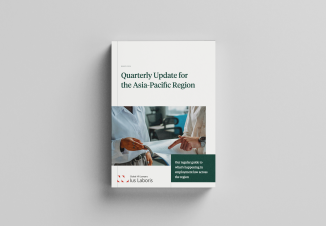
An employer is prohibited from requesting its employees work more than eight hours per day, or 40 hours per week, although this standard limit can be exceeded by agreement, known as an ‘Article 36 Agreement’. The employer must enter into it with a labour union to which the majority of its employees belong or, if such a labour union does not exist, an employee representative who represents the majority of its employees. Once an Article 36 Agreement has been executed, the employer must submit it to the Labour Standards Inspection Office before requiring employees to perform the overtime. Such an agreement is also required if an employer wishes an employee to work on a statutory holiday.
Some employees are exempt from the limits on working time, the most commonly managerial employees. However, the scope of this exemption is interpreted narrowly.
Regarding rest breaks, an employer must provide its employees with rest periods of at least 45 minutes where the daily working hours exceed six hours, or at least one hour where the daily working hours exceed eight hours. Additionally, employers must ensure that their employees at the workplace take their breaks simultaneously, unless otherwise stipulated in a labour-management agreement.
Even if an employer has concluded an Article 36 Agreement with a majority labour union or an employee representative allowing for overtime work, the general rule is that this overtime must not exceed 45 hours per month and 360 hours per year. However, if an Article 36 Agreement with special provisions has been concluded and if there is a temporary and special reason necessitating overtime, overtime that exceeds these limits is allowed on the condition that all of the following requirements are satisfied:
The rate of pay for overtime hours varies depending on the circumstances.
Employers must track employees’ working hours. For this purpose, in principle, employers are required to perform and properly record employees’ start and end times based on objective records. Objective records may include actual recognition by the employer or timecards, integrated circuit cards (‘IC cards’), or personal computer usage time records. In cases where the employees’ start and end times are confirmed by self-reporting, a fact-finding survey must be conducted as necessary to determine whether each employee’s self-reported hours match the actual working hours, and if there are any discrepancies, measures must be taken to correct them. These rules are described in guidelines issued by the Ministry of Health, Labour and Welfare.
These time recording regulations are applicable to all employees in principle. Even for employees who are in managerial supervisory positions, and who are therefore exempt from working hour regulations, employers must track their working hours to ensure their health and safety.
A violation of the rules on working hours or breaks is considered a breach under the Labour Standards Act, which is punishable by six months’ imprisonment or a fine up to JPY 300,000.
It is important that employers in Japan fully understand and comply with the rules on working time as there can be serious consequences for getting it wrong. In particular, employers should make sure to:
Discover more about working hours in our Global HR Guide



